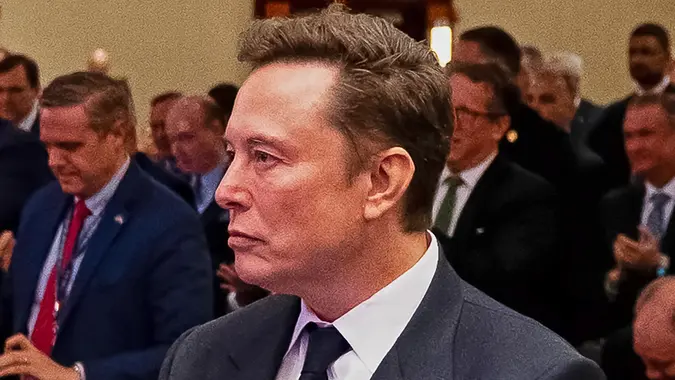Elon Musk Blames Excess Government Spending for Inflation — Do Experts Agree?

Commitment to Our Readers
GOBankingRates' editorial team is committed to bringing you unbiased reviews and information. We use data-driven methodologies to evaluate financial products and services - our reviews and ratings are not influenced by advertisers. You can read more about our editorial guidelines and our products and services review methodology.

20 Years
Helping You Live Richer

Reviewed
by Experts

Trusted by
Millions of Readers
In November, Elon Musk fired off a post on X placing all of the blame for excess government spending on inflation. He also referred to all government spending as taxation. While income taxes are direct taxation, other taxes are indirect, such as a higher money supply that comes from heightened government spending.
Is Musk’s assertion a fair take? Here’s what experts have said about Musk’s position.
How the Government’s Response to COVID Led to Higher Inflation
Melanie Musson is a finance expert with InsuranceProviders.com. She explained how COVID spending set the stage for higher inflation rates:
“In the post-COVID government spending, the public was given money. That meant there was a shift in supply and demand. The extra money meant people could demand products, but there wasn’t an accompanying increase in products, which meant prices increased for consumer products that were in high demand. The government printed money to fund spending. While the overall true wealth of the country remained the same, more cash made up the same amount of wealth. That meant that every dollar became worth less.”
When more dollars chase the same amount of goods, those goods become more expensive. Consumers saw this trend play out in various everyday expenses, such as housing and groceries.
Government Spending Doesn’t Always Translate Into Runaway Inflation
Marko Bjegovic is the CEO and founder at Arkomina Consulting, a company that specializes in U.S. macroeconomic and market research. He explained how some government spending doesn’t always translate into higher inflation rates:
“Higher government spending doesn’t increase inflation unless it directly ends up with consumers (helicopter money or similar). If any government spending was enough to increase inflation, then the Big Deal during the 1930s would have resulted in higher inflation. Still, negative inflation (deflation) remained the primary issue throughout that whole decade.”
However, Bjegovic isn’t vindicating the government, and highlighted how government spending has elevated inflation in recent years:
“Everything else politicians do, including regulation, legislation, tariffs and direct meddling in the economy, increases inflation. In 2020 and 2021, inflation was a result of many things introduced by politicians, including lockdowns, helicopter money (handouts), travel restrictions, vaccine mandates and everything that disrupted the moving of goods and people.”
What Else Drives Inflation?
The federal government’s policies can change the money supply and the movement of people. While the government wields a lot of power in determining inflation rates, they aren’t the only factor.
While both experts mentioned that other factors exist, they still pinpointed excessive government spending as a major catalyst for inflation.
“There are many factors at work, including population growth and money supply, but also everything the government does. Going forward, some new measures like tariffs could have a potentially challenging impact on inflation,” Bjegovic stated.
“Government spending was the primary factor driving inflation over the past few years. There are other factors involved. The other factors may have added to the inflation, but the bottom line is that the government bears the responsibility,” Musson explained.
Can DOGE Bring Inflation Under Control?
Elon Musk has suggested the Department of Government Efficiency (DOGE) can curb government spending and get inflation under control. He also believes DOGE can result in a net surplus and get the government back on track to paying off its debt.
Both experts have expressed caution, mentioning unintended consequences and the roadblocks DOGE can face in Congress.
“Adding another department, even one focused on efficiency, will likely increase government spending. If the department truly had the authority to keep other departments from spending, it could lower inflation. It’s not likely, though,” Musson stated.
“They would need Congress’s approval. Assuming they get it and the spending is cut by $2T, as Elon has said, this could have some adverse economic effects potentially leading to deflation and a severe recession. It is questionable how long Elon will have Trump’s support for fiscal austerity if people start losing jobs uncontrollably,” Bjegovic explained.
Editor’s note on political coverage: GOBankingRates is nonpartisan and strives to cover all aspects of the economy objectively and present balanced reports on politically focused finance stories. You can find more coverage of this topic on GOBankingRates.com.
 Written by
Written by  Edited by
Edited by 

























